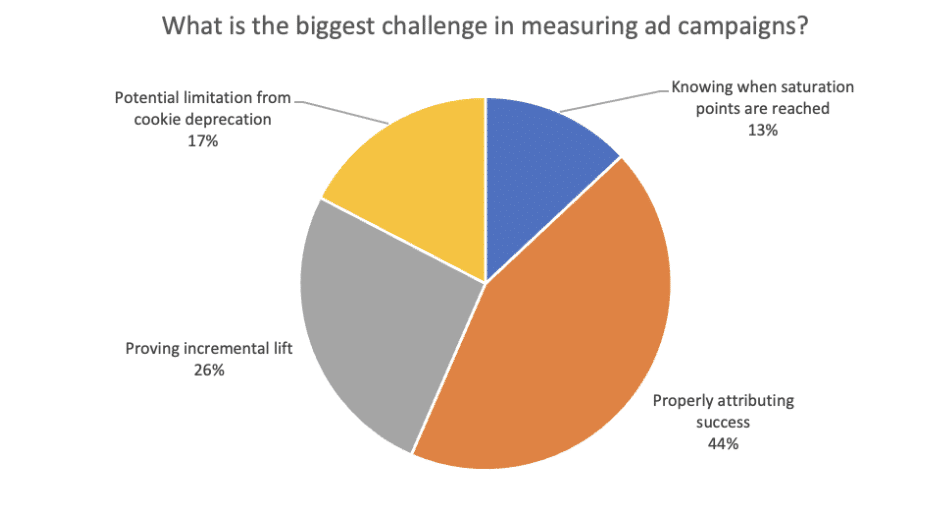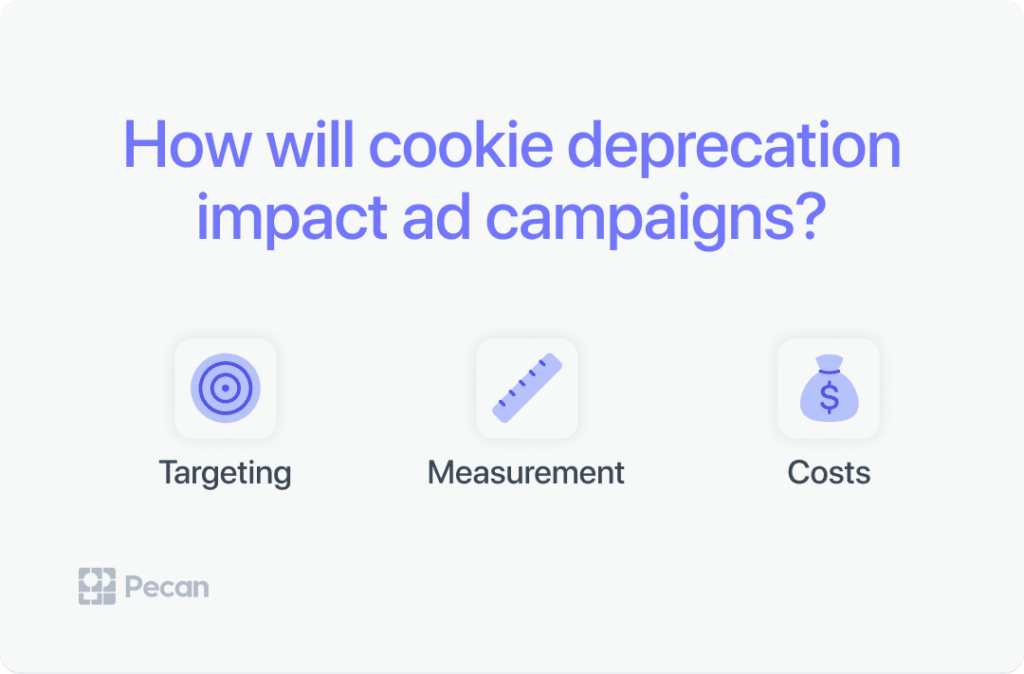Over the last few months, we’ve run a blog series in response to our latest webinar on marketing mix modeling.
The blog series has been driven by the poll question asked in the webinar about the biggest challenges marketers face with measuring their ad campaigns.
Results from a poll during a recent Pecan webinar
We covered properly attributing success and proving incremental lift earlier. Now, let’s take a look at cookie depreciation.
It’s no surprise that cookie deprecation and the changes happening to digital tracking are ranked as a major concern for advertisers. Iterable and CensusWide reported in early 2022 that nearly 50% of CMOs were not ready or prepared for a cookieless future.
In one survey, 64% of marketing managers stated that Apple’s implementation of SKAdNetwork and ATT hurt their ad campaign performance. There’s no doubt that there’s concern about what will happen when Google deprecates cookies in 2024.
Advertisers will need to adapt their strategies and tactics to rely less on cookies and more on alternative methods of targeting and measurement, such as the ones outlined below.
What is cookie deprecation?
If you don’t know by now, cookie deprecation refers to the process of phasing out the use of third-party cookies in web browsers. Third-party cookies are small text files that are placed on a user’s computer by a website. These cookies are used for various purposes such as advertising, analytics, and personalization.
The concern surrounding cookie deprecation stems from the potential impact it could have on the advertising industry and the ability of companies to track user behavior across the internet. Without third-party cookies, advertisers will have a harder time targeting specific audiences and measuring the effectiveness of their campaigns. This change could lead to a decline in revenue for companies that rely on digital advertising.
However, the use of third-party cookies has also raised privacy concerns, as they can be used to track user behavior across multiple websites without users’ explicit consent. This has led to increased scrutiny and regulation of the use of cookies, with many web browsers now blocking or limiting third-party cookies by default. That’s also the case with Apple’s ATT, which limits how an advertiser can track user behavior across mobile applications.
As a result, companies are now exploring alternative methods for targeting and measuring the effectiveness of their digital advertising campaigns, such as using first-party data or contextual targeting and various measurement approaches like marketing mix modeling (MMM). While cookie deprecation may bring about some short-term challenges, it’s ultimately a step towards a more privacy-focused and transparent online ecosystem.
How will cookie deprecation impact ad campaigns?
The impact of cookie deprecation on ad campaigns will depend on the specific advertising strategies and tactics being used. However, there are some general ways in which cookie deprecation could affect ad campaigns:
- Targeting: Third-party cookies have traditionally been used to target ads to specific audiences based on their browsing history and behavior. Without access to this data, advertisers may need to shift away from behavioral targeting and rely more on alternative methods, such as contextual targeting, where ads are served based on the content of the webpage or using first-party data. First-party data is data collected directly from users who have interacted with a brand.
- Measurement: Third-party cookies have also been used for measuring the effectiveness of ad campaigns, such as tracking conversions or attributing sales to specific ads. Without access to this data, advertisers may need to use alternative measurement methods, such as marketing mix modeling that focuses on aggregated channel, campaign, and sales data.
- Costs: If unable to target and measure ads as effectively as before, advertisers may need to spend more on ad campaigns to achieve the same results.
What can marketers do?
Advertisers can take several steps to find solutions to cookie deprecation. It will require a change from the status quo and, in some cases, a shift away from the programmatic solutions that have been the center of the marketing landscape for the last five to 10 years.
These changes could range from a shift back to contextual targets and the use of offline media spaces to a complete shift in attribution methodologies.
If a cookieless future is on the horizon, there’s an inherent need for advertisers to move away from cookie-based attribution methodologies and towards a marketing mix modeling approach.
Marketing mix modeling uses historical data to identify the relationship between marketing spend and sales and can provide insights into which marketing channels are most effective for driving revenue. By analyzing data from different channels, MMM can help advertisers optimize their advertising budgets and make informed decisions about where to invest their marketing dollars.
There is hope for an effective post-cookie strategy. Advertisers can address cookie deprecation by collecting more first-party data, using contextual targeting, exploring alternative identifiers, and leveraging marketing mix modeling to measure the effectiveness of their advertising.
Ready to move beyond cookies in your marketing attribution strategy? Contact us to set up a time to chat about Pecan and how we can support your team’s needs.





